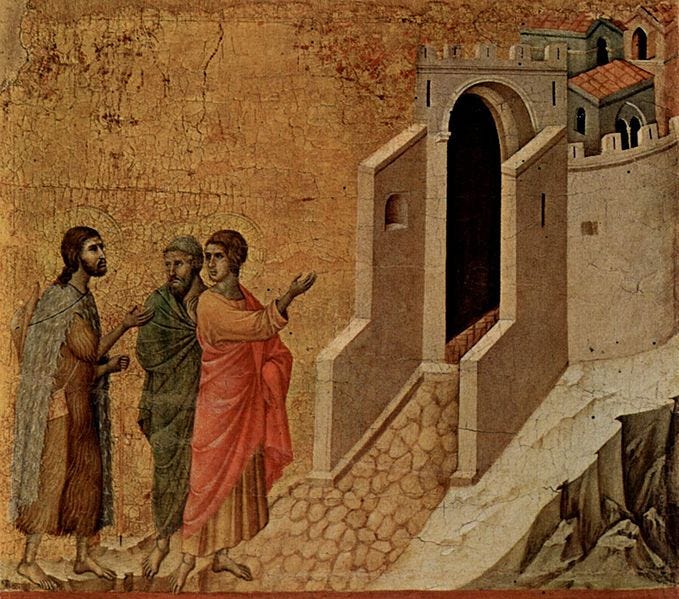When Matins of the Benedictine Divine Office repeats the same reading throughout the octave of Easter, we need to pay attention:
“Consepulti enim sumus cum illo per baptismum in morte, ut quomodo Christus surrexit a mortuis per gloriam Patris, ita et nos in novitate vitae ambulemus.”
“For we are buried together with Christ by baptism into death, that as Christ is risen from the dead by the glory of the Father, so we also may walk in newness of life.”
(Romans 6:4)
Let’s see how this reading is to be understood and why it is so central for understanding the octave of Easter.
“Consepulti enim sumus cum illo per baptismum in morte (For we are buried together with Christ by baptism into death)”
According to St. Thomas’s commentary on the letter to the Romans, we are buried together with Christ, insofar as we are “in conformity with the death of Christ”; that is, insofar as we bear on our body “the marks of Jesus” (Gal 6:17) or insofar as we are “always carrying in the body the death of Jesus” (2 Cor 4:10). Hence we are buried together with Christ when we are united to Christ in his Passion.
How can one do this?
Baptism itself is a kind of burial with Christ, with its triple immersions “to represent the three days of Christ’s burial.” This is also the reason why “the solemn baptism is celebrated in the Church on Holy Saturday when the burial of Christ is commemorated.” Since the baptism is a burial, and is what it signifies (as a sacrament), “it produces such a death in the baptized.”
What kind of a death is effected?
St. Thomas says it is the “death to sin.” Therefore, all who are baptized are dead to sin, as Christ died to his mortal life, in which there was the likeness of sin (though no sin was there).

“ita et nos in novitate vitae ambulemus (so we also may walk in newness of life)”
Now that we know what it is to be buried with Christ, what is it to rise with Christ?
According to St. Thomas, it is “whatever leads to restoration, i.e., being without sin.” This is the newness of life referred to by St. Paul. Newness of life is to “advance in the spiritual life through good works.” Before, we were conformed to Christ’s death, and now, “as we are united with Christ in his passion, we shall be also in the likeness of his resurrection, so as to live blamelessly in our present life and to attain to a glory similar to his in the future life.”
A key aspect of living in newness of life is to place upon others the mantle of charity, covering over their flaws with excuses and attending to their needs (this idea of the mantle of charity is given by Fr. Bauknecht, FSSP). If we Catholics truly understood this, then indeed the world would be transformed. There is a struggle to die to sin, to live out our baptism, but besides that we must practice charity (and not only by working in a soup kitchen). We must go out of our way to help the poor in our own community, as the early Christians did, making sure that no person in our parish is in need; we are commanded to do so by Pope St. Leo in his Advent homilies. And of course, according to St. Thomas, anyone else who comes to us, even our enemies, must be helped with their basic needs (Summa Theologiae II-II q. 25, a. 9 ad).
According to Eamon Duffy’s Stripping the Altars, the medieval Christians took this injunction to charity so seriously that they viewed the poor as the wounds of Christ, and understood that by taking care of them, He was consoled. They also believed that if we failed to do this, then the wounds of Christ would become an accusation against us at the Judgment.
The commandment given to us is that we must love others as Christ has loved us (Jn 15:12), that is, in a supernatural manner. We must love others in Christ, as Christ loves us. This means loving others not only when it is easy, but when it is difficult: loving not only our neighbors, but our enemies; loving not only those who are kind to us, but those who wish us ill and harm.
Fr. Bauknecht, FSSP, goes so far as to say that this means we must love even those who torture us to death.
Hard words, perhaps, and by nature alone, impossible. But not impossible by God’s grace: the grace we received when we were baptized into Christ’s death, so that we might walk in newness of life.



